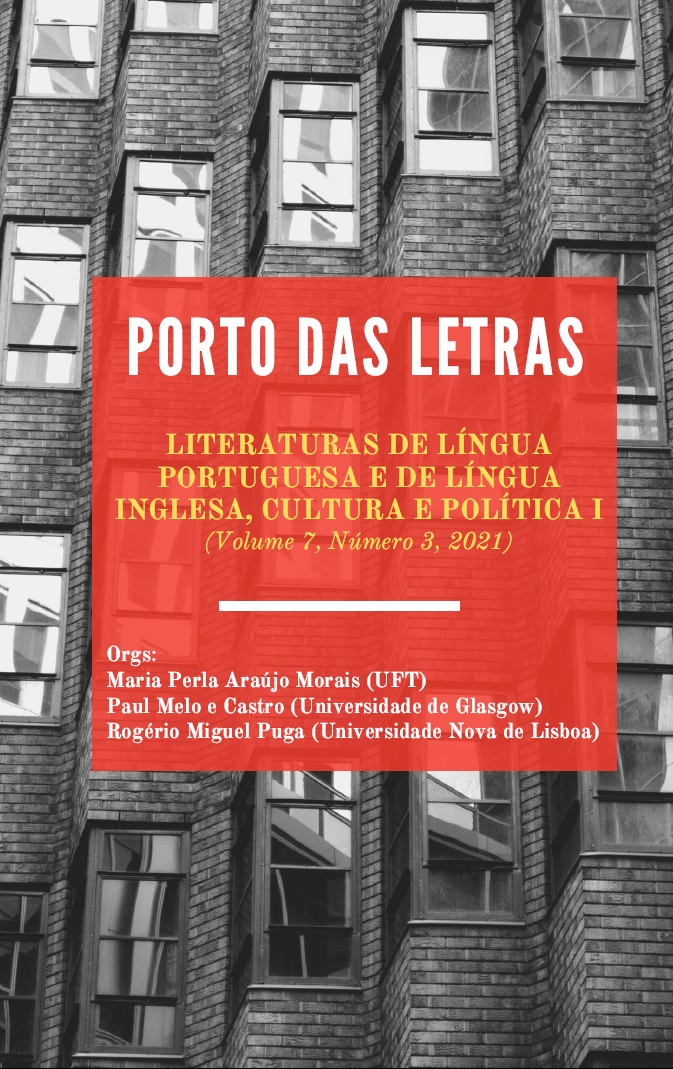KENYA’S REPRESENTATION OF INDEPENDENCE IN A GRAIN OF WHEAT, BY NGŨGĨ WA THIONG’O
Keywords:
Literature and history, postcolonialism, memory and identity, violence and traumaAbstract
This research analyzes the representation of Kenya's independence in Ngũgĩ wa Thiong’o’s A Grain of Wheat. The aim of this study is to investigate the articulations between memory, violence and trauma in the above-mentioned literary text, reflecting about the relationships between literature and history (ARISTOTLE, 2008; BORGES, 2010; CUTI, 2010; LAMMERT, 1994; PESAVENTO, 2003; WHITE, 1994; and others). The work results from a bibliographic research that evolved from the analysis of the literary text, highlighting the overlap between memory, violence and trauma. The discussion of these concepts took place by mapping excerpts from the novel, focusing on the actions and languages of the characters. Memory is discussed based on the contributions of Candau (2019), Monte (2012) and others. The reflection on colonial violence took place from the readings of Fanon (1968), Karari (2018), among others. The analysis of trauma reflected in the fictional characters is carried out in dialogue with Seligmann-Silva (2003; 2002). Furthermore, the result of this research points out that the author uses historical episodes, redraws the scenes of the catastrophe and engenders a writing that presents itself as enunciator of pains, which aim is to announce a new time, which turns to the past and seeks lessons in it to reconstruct the present, while working with sensible themes for a country achieving its independence.
References
Calouste Gulbenkian, 2008.
BORGES, Valdeci Rezende. História e literatura: algumas considerações. Revista de Teoria História-Journal of Theory of History, v. 3, n. 1, p. 94-109, 2010.
BRUGIONI, Elena. Literaturas africanas comparadas: Paradigmas críticos e representações em contraponto. Campinas, SP: Editora da Unicamp, 2019.
CANDAU, Joël. Memória e identidade. Tradução de Maria Letícia Ferreira. São Paulo:
Contexto, 2019.
CANDIDO, Antonio. Literatura e Sociedade: Estudos de Teoria e História Literária. 8. ed. São Paulo: T. A. Queiroz, 2000.
CRICHYNO, Jorge. Árvore e imaginário simbólico como lugar poético de memória na
paisagem. Revista do NUFEN, v. 9, n. 2, p. 124-137, 2017.
CUTI, Luiz Silva. Literatura Negro Brasileira. São Paulo: Selo Negro, 2010.
FANON, Frantz. Os condenados da terra. v. 42. São Paulo: Civilização Brasileira, 1968.
GIKANDI, Simon. Introdução. In: THIONG’O, Ngũgĩ. Um Grão de Trigo. Alfaguara, Rio de Janeiro, 2008, p.5-12.
GINZBURG, Jaime. Autoritarismo e literatura: a história como trauma. VIDYA, v. 19, n. 33, p. 10, 2000.
JAMESON, Fredric. O Inconsciente político: a narrativa como ato socialmente simbólico.
Ática, 1992.
KARARI, Peter. Modus Operandi of Oppressing the “Savages”: The Kenyan British
Colonial Experience. Peace and Conflict Studies, v. 25, n. 1, p. 2, 2018.
LÄMMERT, Eberhard. História é um esboço: a nova autenticidade narrativa na historiografia e no romance. Estudos avançados, v. 9, n. 23, p. 289-308, 1995.
MAZRUI, Ali A. O desenvolvimento da literatura moderna. In: História Geral da África,
vol. VIII. Brasília: UNESCO, 2010, p. 663-696.
MONTE, Arivaldo Leandro da Silva. O retrato e a moldura: memória e oralidade em cada homem é uma raça. 2012. 175 f. Dissertação (Mestrado em Linguística Aplicada; Literatura Comparada) - Universidade Federal do Rio Grande do Norte, Natal, 2012.
MOREIRA, Terezinha Taborda. História, violência e trauma na escrita literária angolana e moçambicana. Cadernos CESPUC de Pesquisa Série Ensaios, p. 1-12, 2015.
OLIVEIRA, Bruno Ribeiro. Ngũgĩ Wa Thiong’o: o percurso de um intelectual africano e a História do Quênia (1964-1985). Métis: história & cultura, v. 17, n. 34, 2018.
PESAVENTO, Sandra Jatahy. O mundo como texto: leituras da História e da Literatura.
Revista História da Educação, v. 7, n. 14, p. 31-45, 2003.
PINOTTI, Henrique Walter. A filosofia da cirurgia: a doutrina da filosofia da cirurgia é centrada no paciente, um ser humano. ABCD. Arquivos Brasileiros de Cirurgia Digestiva (SãoPaulo), v. 21, n. 3, p. 103-105, 2008.
RANCIÈRE, Jacques. A partilha do sensível–arte e política. São Paulo: EXO Experimental (org.), 2005.
SAID, Edward. Territórios sobrepostos, histórias entrelaçadas. In: ________. Cultura e
Imperialismo. São Paulo: Companhia das Letras, 2011. p. 34-116.
________. Introdução. In: ________. Cultura e Imperialismo. São Paulo: Companhia das
Letras, 2011. p. 9-33.
SZYMBORSKA, Wislawa. Alguns gostam de poesia. Poemas. São Paulo: Companhia das Letras, 2011.
THIONG’O, WA, Ngũgĩ. Um grão de trigo. Rio de Janeiro: Alfaguara, 2008.
________. Homecoming: essays on African and Caribbean literature, culture and politics. Heinemann, 1972.
________. Moving the Centre: the struggle for cultural freedoms. London: James Currey, 1993.
WHITE, Hayden. Teoria literária e escrita da história. Revista Estudos Históricos, v. 7, n. 13, p. 21-48, 1994.
________. The question of narrative in contemporary historical theory. History and theory, v. 23, n. 1, p. 1-33, 1984.
Downloads
Published
How to Cite
Issue
Section
License
Os autores concordam com os termos da Declaração de Direito Autoral, que se aplicará a esta submissão caso seja publicada nesta revista (comentários ao editor podem ser incluídos a seguir).

